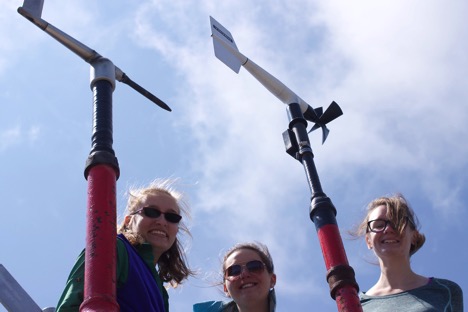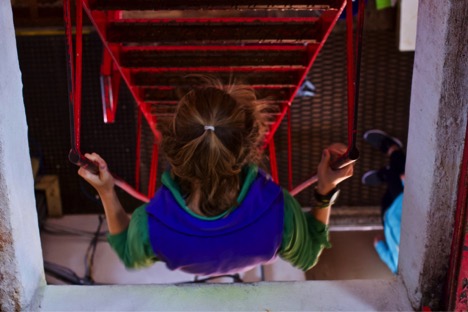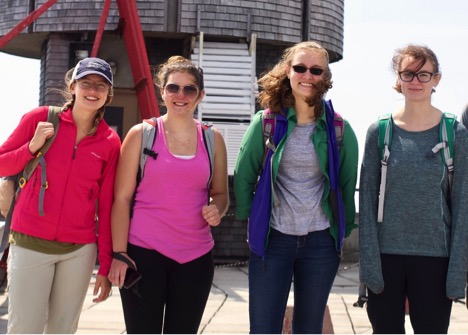
Liz, Shannon, and Rachel on top of New England at the Observatory tower next to two anemometers. Photo: Sophie Adams
As the week and the summer comes to a close, the FOS-TER crew has been working hard to tie up some loose ends and prepare the research for its next phase.
On Monday, we got a nice reprieve from our work to tour the Mount Washington Observatory with Dr. Kelsey. Mount Washington has some of the most extreme weather in the world, along with one of the longest continuous weather observation records. So, it’s a pretty special place in the weather world. We got to meet a couple of observers, interns, and other mountain staff. We also got to hike to a nearby crag for lunch and feel some of the wind kick up around the mountain. It was quite the day at the office.
The rest of this week we’ve been working on compiling final reports, graphs, and presentations. Tuesday was our last field day and included constructing, deploying, and programming the micrometeorological station at the “Frankenlog.” We also placed six more TDR (time domain reflectometry) sensors on and around the “mother” stump next to the log. All of the projects are producing interesting data thus far, even though we just deployed a lot of them. We’re hoping that the data produced from these projects can help scientists at Hubbard Brook achieve more breakthroughs and further the research.
Our goals for this project were to understand and gather more data in a cost-effective way to improve models of forest micrometeorology, the net energy budget, and future climate change prediction. After all, cheaper instruments = more data = better analysis = improved models! We’ve successfully deployed and are capturing data from all of the stations thus far, proving that it is possible to make cheap and efficient instruments!
This summer has truly been a transformative experience in research for all of us. The entirety of this research team came in with little experience doing field work in hydrometeorology, but the ability to contribute to this field has been invaluable. We often hear “experiential learning” thrown around as a buzzword, but in this experience, we learned our own capabilities to achieve and apply knowledge in ecology, hydrology, meteorology, and statistics. We’re excited to hopefully continue this research and expand the WAT-SEN lab to incorporate more projects and collaborators around forest micrometeorology. We’ve only just started investigating this scientific field and the effects that the forest can have on our weather in the midst of climate change.
 Down the hatch… oh and watch your head! Liz climbs down after exploring the Observatory tower. Imagine going up that tiny staircase in full winter gear to take measurements! Photo: Sophie Adams
Down the hatch… oh and watch your head! Liz climbs down after exploring the Observatory tower. Imagine going up that tiny staircase in full winter gear to take measurements! Photo: Sophie AdamsEndless appreciation and gratitude for the patience, guidance, and assistance from Dr. Eric Kelsey, Dr. Mark Green, and Dan Evans. The other collaborators on the project also helped us out a great deal, so equal doses of appreciation and gratitude to Chris Woodall from the US Forest Service, David Lutz and Meredith Gurnee from Dartmouth College, Shawn Fraver from the University of Maine, Ian Halm from the US Forest Service, and everyone else who contributed thus far.

The FOS-TER crew! Stay tuned to more updates coming in the fall, we’ve had a lot of fun keeping you in the loop this summer. Photo: A friendly woman at the top of Mt. Washington
Please contact us if you have any other questions about our results for this summer, and stay tuned for further updates in the Fall!
